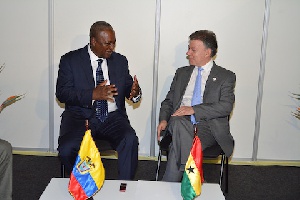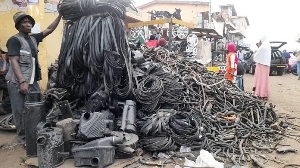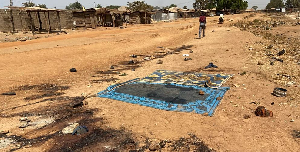President John Dramani Mahama on Tuesday pledged his commitment to champion the cause of sustainable urban development in Africa, working in collaboration with fellow African leaders.
President Mahama made the commitment when he addressed the United Nations (UN) Habitat 7th World Urban Forum (WUF7) currently underway at Medellin, Colombia, following an invitation extended to him by the UN-Habitat to champion the African Urban Agenda for sustainable urban development.
The WUF7 event is being held on the theme: ¨Urban Equity in Development – Cities for Life,¨ and will focus on seeking ways to strengthen and develop institutional framework for sustainable urban development and housing.
President Mahama said statistical evidence confirmed that the 21st century will be the African Urban age, projecting that by 2050, about 60 per cent of Africa’s population would be living in cities.
He referred to urbanisation as “a fact of Africa´s development that cannot be wished away,” and observed that Africa was not only urbanising very fast, but was also the youngest continent in the world with at least 20 per cent of the population aged between 15 and 24 years.
He said for African nations, this demographic shift was occurring without the complementarity of industrialisation as was experienced elsewhere, adding that Africans must address the urbanisation phenomenon that was occurring in the context of very high levels of rural-to-urban migration, limited local productive capacity and growing unemployment; dominated by a youth bulge.
President Mahama said the challenges of this mix included inadequate urban services, climate change and significant gaps in innovative planning, and that it was time to look more carefully at the emerging African Urban Age as “we observe multitudes of our citizens putting their lives at great peril to cross deserts and oceans in order to look for the ever shrinking promise of a better life in Western Europe".
He said African leaders and ordinary citizens together had to urgently craft interventions that will make their cities viable in the face of the challenges they faced.
“These interventions must create equal opportunity for all our people to take advantage of the African dream,” he added.
President Mahama indicated that the Arab Spring had taught Africa that it was no longer acceptable to be ambivalent about the needs of the poor and marginalized in society.
He observed that in the next two decades African urbanisation will continue to grow rapidly, and towns in the Sahelian regions will grow just as fast as the coastal cities. “The implementation of innovative concepts of urban development corridors and mega-urban regions is no longer a question of ‘if’, but ‘when’ ”.
President Mahama said although the phenomenon of mega?urban regions and corridors reflected the extent of the challenge African countries faced, it also indicated the potential for investment and the opportunity for economic growth, whereby domestic and foreign investors had the opportunity to forge partnerships with central and local governments to invest in infrastructure, service and industry.
In a speech, President Senor Juan Manuel Santos of Colombia said the commitment of world leaders are needed in order to achieve transformation of well-planned urban cities.
He said Colombia was more than willing to listen and learn from all the experts gathered at the forum.
President Santos noted that a few years ago, Medellin was full of filth and drug related cases, with three out of four Colombian citizens living in urban areas.
He further stated that housing was one of the things that will get the world out of poverty; adding, “Not just social housing, but decent housing.”
Dr. Jan Clos, Executive Director of UN-?Habitat, and Mr. Anibal Gaviriia Correa, Mayor of Medellin also took turns to address the forum
WUF7 will serve as a platform to determine the guidelines for Habitat III, the Third United Nations Conference on Housing and Sustainable Urban Development scheduled for 2016.
It will also look at progress in understanding the role of local governments in drafting proposals and policies for urban development.
General News of Wednesday, 9 April 2014
Source: GNA
Mahama pledges to champion Africa's urban development
Entertainment

Daddy Lumba's 'ghost' is tormenting us – Aunt cries out
Opinions










